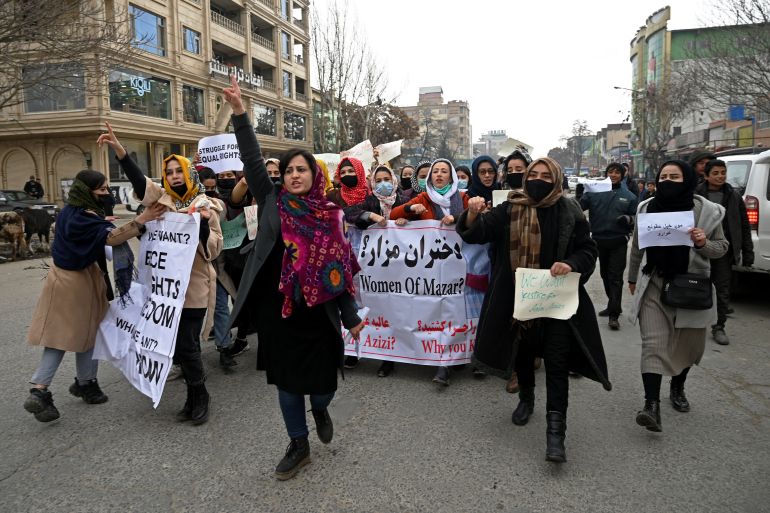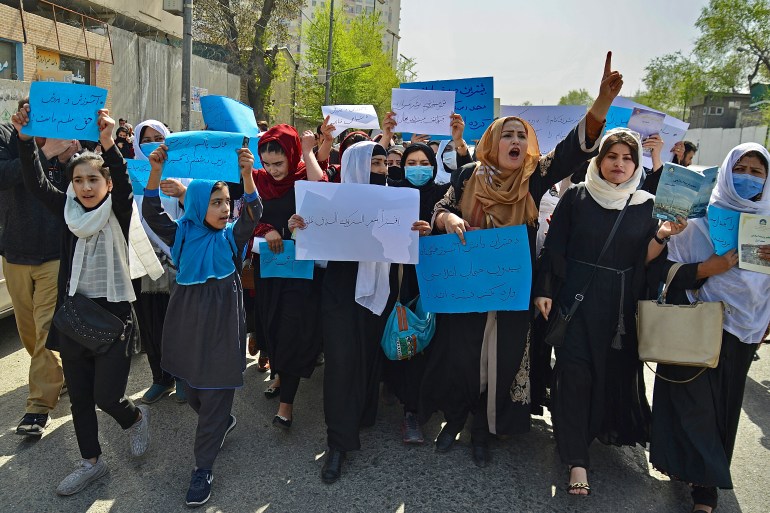Shrinking public space for Afghan women as Taliban expands curbs
The group is reimposing draconian restrictions, especially against women, that are reminiscent of their past regime.

Kabul, Afghanistan – As a 35-year-old university lecturer, Nazifa regularly took the local minivan, a popular means of transport in the Afghan capital, Kabul, for her daily commute from home to the university and back. As a native of the city, she was very familiar with the highways, streets and back alleys, and rarely ever felt uncomfortable travelling by herself.
That was until last week, when the minivan that Nazifa, who requested her name be changed, was travelling in was stopped by a Taliban guard.
Keep reading
list of 4 itemsThe uncertain future of girls’ schools in Afghanistan
Is Afghanistan being cut off from the world?
For struggling Afghanistan families, next meal a matter of faith
“I was on my way home along with another female colleague when a Taliban stopped our vehicle and asked us where our mahram [male guardian] was. When we told him we did not have one, he was furious,” she told Al Jazeera.
“He made the driver drop us back to where we were picked from, instructing him not to take female passengers without mahrams. We had to walk for half an hour across the checkpoint before we could find another taxi who could take us home,” she said.
“I felt very hopeless and sad that day,” Nazifa said. “Since then I feel so much fear while travelling to work. I am so afraid they will stop me again, and punish me. It is so humiliating to be considered so worthless in one’s own homeland,” she said, breaking down.
Reminiscent of their last regime in the 1990s
Since taking over Afghanistan last year, the Taliban rulers have reintroduced draconian restrictions on freedoms and movements, particularly directed at women, that are reminiscent of their last regime in the 1990s.
Increasingly though, over the last few weeks, the Taliban leaders, particularly from its Ministry of Propagation of Virtue and the Prevention of Vice, have announced many new restrictions, even as criticism and international pressure mount against them.
I am both father and mother to my daughters. I am the man and woman of my household. I need to go out to care for my family. Where do I get a mahram from?
In December, the ministry, which replaced the Afghan Ministry of Women Affairs, imposed restrictions on women from travelling farther than 72km (45 miles) without a close male relative. This restriction was further expanded last week to include travelling abroad, and several solo women travellers were reportedly stopped from boarding flights. Similar bans were also introduced in several healthcare centres across the country, forbidding women to access healthcare without a mahram.
However, while there are no specific restrictions on women travelling within the city, the Taliban has reportedly instructed local taxi drivers in the Afghan cities against taking unaccompanied female passengers or if they are not dressed in a proper hijab or headscarf, as defined by the Taliban. They frequently stop lone women travellers and punish taxi drivers who ferry them.
Sadeq Akif Muhajir, a spokesman at the Taliban ministry, defended the restriction in local media, saying they are “not limitations for women, it is for the protection of their honour”.
However, many Afghan women disagree. “It is not possible for me to have mahram; my husband cannot go to work with me every day,” Nazifa argued.
She questioned whether the Taliban’s intention was to discourage women from going to work “considering the restrictions they keep imposing, I fear that they eventually won’t let women go to work without mahram, because having mahram at work is not possible”, she said.
‘A long string of broken promises’
A number of other decrees issued in the last few weeks, directed towards women, have ordered hijab for women at workplaces, gender segregation in public parks, and continued closure of girls’ high schools, which has triggered protests from Afghan women and elicited strong international criticism.
The Taliban had briefly reopened schools for girls on March 23, following months of relentless pressure. However, celebrations were short-lived, as they were immediately closed again without any explanations.
“We were sitting in the classroom when two Taliban members entered, and asked us, ‘With whose permission have you entered the schools?’. They were carrying weapons and asked us to leave,” 15-year-old Sara narrated, the disappointment heavy on her voice.
That night she cried herself to sleep, her sister said. “This is all I prayed for the last seven months, to be able to go back to school again and continue my education to achieve my dreams,” Sara said, adding that she wanted to be a judge when she is older – a profession the Taliban deems inappropriate for women. “Perhaps they are afraid of educated women,” she said.
Describing the increasing restrictions as “a long string of broken promises”, Heather Barr, associate director at Human Rights Watch, called for the international community to increase pressure on the Taliban.
“But this flurry appears to signal an escalation in attacks on women’s rights. More broadly, the Taliban appear to have stopped giving any pretence of appeasing donors in hopes of gaining aid and recognition,” she said in a recent HRW statement.
The situation is harder for women-led households such as Gulalai, a 50-year-old widow, who also requested her name be changed to protect her identity. On March 23, the mother of two young girls was returning from the market when her taxi was stopped by the Taliban who questioned her about mahram.
“I was so scared that they might drag me out of the vehicle, or maybe the driver. Before I could answer though, a kindly older man in the front seat intervened and pretended to be my mahram, and that is when they let me go,” she recalled.
Gulalai’s experience left her afraid and frustrated, particularly for the safety of her daughters who she has raised by herself since losing her husband 14 years ago.

“I am both father and mother to my daughters. I am the man and woman of my household. I need to go out to care for my family. Where do I get a mahram from?” she said.
“Afghanistan has many widows, and not everyone has a mahram,” Gulalai said, raising a disturbing yet important truth about the country that has seen 40 years of war, starting with the Russian invasion in 1979 followed by two decades of US occupation until last August.
The country has been reeling from a humanitarian crisis with more than half of the population facing hunger. The Taliban has struggled to revive the aid-dependent economy, which is in free fall due to sanctions and exclusion from international financial institutions.
“For us, zamin sakht, wa asmaan door ast,” she said quoting an old Afghan proverb which translates to: “the ground is hard and the sky is high”, illustrating the challenges Afghan women face.